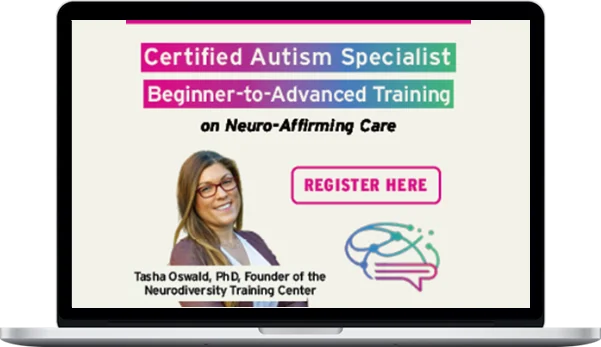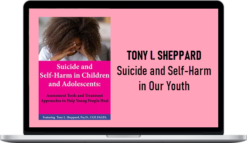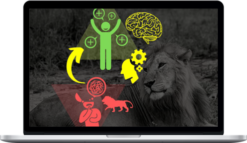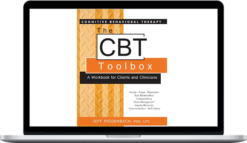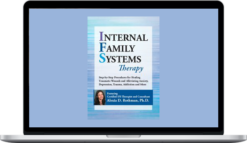Tasha Oswald – Autism Specialist: Beginner-to-Advanced Training On Neuro-Affirming Care
$60.00 $30.00
Total Sold: 1
»Instant Delivery
Description
Tasha Oswald – Autism Specialist: Beginner-to-Advanced Training On Neuro-Affirming Care
Become a fully confident, certified autism treatment specialist!
Join Dr. Tasha Oswald, PhD, one of today’s most in-demand autism specialists!
More autistic clients than ever are coming to therapy to find support as they navigate a neurotypical world that frequently misunderstands, excludes, and even traumatizes them.
Unfortunately, most therapists haven’t received the up-to-date training needed to effectively support these clients—sometimes resulting in further harm.
That’s why we’re inviting you to this state-of-the-art program, offering the most comprehensive training we’ve ever created for working with autistic adults and teens…
…including live case consultation calls where you’ll dive deep into real-world clinical scenarios — and walk away with proven strategies to better support your clients.
Join neurodivergent author, consultant, and clinician, Dr. Tasha Oswald, who will walk with you every step of the way …
… and equip you with the skills, confidence, and credentials to know exactly what to do and say when working with autistic clients — both before and after a diagnosis.
A Personal Invitation from Dr. Tasha Oswald
Several years ago, I began writing blogs for autistic adults in tandem with the launch of my autism specialty practice. Soon after, messages began to pour in from autistic individuals from across the US and worldwide, asking for my help.
I was moved by their stories about the profound lack of affirming autism services in their area. Ever since, it’s been my mission to help close the serious gap in mental health services for autistic adults by providing training on neuro-affirming practices.
I genuinely appreciate that you are here and share my mission of supporting and valuing our neurodivergent community.
That’s why I’m so excited to invite you for this training, which has something for every clinician…
… from therapists wanting foundational training to autism specialists wanting to stay up-to-date on research or deep dive into complex issues.
This exclusive program brings together everything I’ve learned in effective neuro-affirming care for autistic clients.
I’m so thrilled to have you join me and am deeply grateful for care providers like you who are willing to provide the safe, inclusive space that autistic clients need to truly thrive!
Warmly,
Tasha Oswald, PhD
PART 1: Foundations of Autism
Module 1 – Models of Autism: Medical and Social Models
- Self-Reflection Exercise to Explore Assumptions about Autism
- Overview of Medical Model
- Overview of Social Model
- Neurodiversity Language Introduced
Module 2 – Autistic Traits: What All Therapists Need to Know
- Autism as Defined by the Medical Model (DSM & ICD)
- Autistic Experiences Not in the DSM
- Explore Case Examples
- Autism as Defined by the Autistic Community
- Neurodiversity-Affirming Language Guide
Module 3 – Providing Culturally Competent and Neurodiversity-Affirming Care
- History of the Neurodiversity Movement
- Autistic Identity and Autistic Culture
- Neurodiversity-Affirming Approach is Culturally Responsive
- Evaluating and Addressing Your Own Ableist Biases
- Alternatives to Ableist Language
Module 4 – Hot Topics in Autism
- Interoception and Alexithymia
- Autistic Burnout
- Pathological Demand Avoidance (PDA)
- Rejection Sensitive Dysphoria (RSD)
- Intersectionality (BIPOC, LGBTQIA+, Autigender, Neuroqueer)
- Autistic Masking and Camouflaging
Module 5 – Trauma and Autism
- PTSD and Autism
- Complex PTSD and Autism
- Common Sources of Trauma for Autistic Individuals
- Autism-Specific Risk Factors for Trauma
- Differential Diagnosis of Autism and PTSD
PART 2: Case Conceptualization, Screening, and Assessment
Module 6 – Clinical Considerations for Special Populations
- Late-Life Diagnosed Autistic Adults
- Women and Autism
- Highly Sensitive Person (HSP) and Autism
Module 7 – Case Conceptualization: Unraveling the Complexity
- Dispelling Misconceptions about Autism
- Variations in Autism Presentation
- Common Presenting Problems
- Case Examples
Module 8 – Autism in Context: History, Causes and Neurodevelopment
- History of Autism
- Prevalence Rates and Trends Over Time
- Genetics and Environmental Factors
- Autism Theories, Double Empathy and Monotropism
- Current Research, Risks, and Limitations
Module 9 – Autism Screening, Identification and Diagnosis: What all Therapists Need to Know
- Is My Client Autistic? Signs Therapists May Notice
- Adult Autism Screening Tools
- Autism Assessment Process and Making a Referral
- Common Co-Occurring Diagnoses and Differential Diagnosis
- Why is Autism so Often Misdiagnosed or Undiagnosed
Module 10 – After the Autism Diagnosis: Now what?
- Common Client Reactions to an Autism Diagnosis
- Common Parent and Family Reactions to an Autism Diagnosis
- Post-Assessment Support and Adjunctive Services
- Family, Community and Educational Support
- Executive Functioning Support
- Employment and Housing Support
- Sensory and Fine and Gross Motor Support
- Psychiatric, Pharmacological, and Medical Support
PART 3: Mental Health Treatment and Autism
Module 11 – Neurodiversity-Affirming Therapy: Principles and Strategies
- What Autistic Clients Need From a Therapist
- COMPASS Mnemonic for Neuro-Affirming Therapy
- Neuro-Affirming Principles and Strategies
- Applying a Neuro-Affirming Approach to Case Examples
- Overcoming Treatment Barriers
Module 12 – Treatment Planning
- How to Set Neuro-Affirming Treatment Goals
- Developing Goals for Common Presenting Problems
- When to Treat, When to Refer and How to Get Consultation
- How to Prioritize Treatment Goals
- Coordinating Care with Other Professionals
Module 13 – Interventions to Support Autistic Clients
- Neuro-Affirming Strategies for Intake and Initial Sessions with Client
- Interventions to Support Self-Awareness and Self-Acceptance
- Interventions to Explore Sensory Systems, Sensory Diets and Self-Care
- Interventions to Support Emotion Regulation and Reduce Overwhelm
- Interventions to Support Relationships and Socio-Emotional Communication
- Tips and Clinical Insights
Module 14 – Evidence-Based Approaches for Co-Occurring Mental Health Concerns
- Research on Anxiety and Depression in Autism
- Research Risks and Limitations
- Modifying CBT Protocols to Treat Anxiety and Depression in Autistic Clients
- CBT-Based Case Examples
- Emerging and Promising Treatment Approaches: IFS and DBT
About Tasha Oswald
Tasha Oswald, PhD (she/her), is a neurodiversity-affirming licensed psychologist and clinical consultant, IFS Level 3 trained and polyvagal-informed. Previously with the University of California, Davis’s MIND Institute, she’s currently the founder and director of Neurodiversity Wellness Center, a private practice specializing in mental health services for neurodivergent adults, teens, and their families, and Neurodiversity Training Center, providing consultation and training to providers on neuro-affirming care.
Identifying as neurospicy and receiving a later life diagnosis of ADHD, Dr. Oswald believes that no single neurotype or diagnostic label fully defines her. She is a proud member of a beautifully neurodiverse, multicultural family. She is passionate about supporting therapists in exploring their own neurotypes and intersecting identities.
She specializes in working with autistic and ADHD women, neurodivergent working professionals and emerging adults, neurospicy individuals who do not meet DSM criteria, and self-identified or late-life diagnosed autistic or ADHD adults. Seeing the transformative power of group therapy for autistic adults, group work is a cornerstone of her practice.
Being in the field for 20 years, Dr. Oswald has received extensive training in autism. After completing her PhD in psychology with an autism emphasis, she was awarded an NIH-Funded Autism Research Training Program (ARTP) post-doctoral fellowship. Through this fellowship program, she engaged in interdisciplinary training and research at the world-renowned UC Davis MIND Institute. There she developed and established a therapy group program for autistic young adults called the ACCESS Program.
She has published autism research in preeminent research journals. Today, Dr. Oswald is an active blogger on neurodiversity and as an autism expert contributes to global media outlets including Reader’s Digest and PscyhCentral. As a speaker and advocate, she has presented at numerous conferences, universities, community groups, and companies to raise awareness of mental health topics related to autism in adulthood.
More courses from the same author: Tasha Oswald
Delivery Policy
When will I receive my course?
You will receive a link to download your course immediately or within 1 to 21 days. It depends on the product you buy, so please read the short description of the product carefully before making a purchase.
How is my course delivered?
We share courses through Google Drive, so once your order is complete, you'll receive an invitation to view the course in your email.
To avoid any delay in delivery, please provide a Google mail and enter your email address correctly in the Checkout Page.
In case you submit a wrong email address, please contact us to resend the course to the correct email.
How do I check status of my order?
Please log in to HealthcareCourse account then go to Order Page. You will find all your orders includes number, date, status and total price.
If the status is Processing: Your course is being uploaded. Please be patient and wait for us to complete your order. If your order has multiple courses and one of them has not been updated with the download link, the status of the order is also Processing.
If the status is Completed: Your course is ready for immediate download. Click "VIEW" to view details and download the course.
Where can I find my course?
Once your order is complete, a link to download the course will automatically be sent to your email.
You can also get the download link by logging into your HealthcareCourse account then going to Downloads Page.
Related products
Total sold: 4
Total sold: 2


